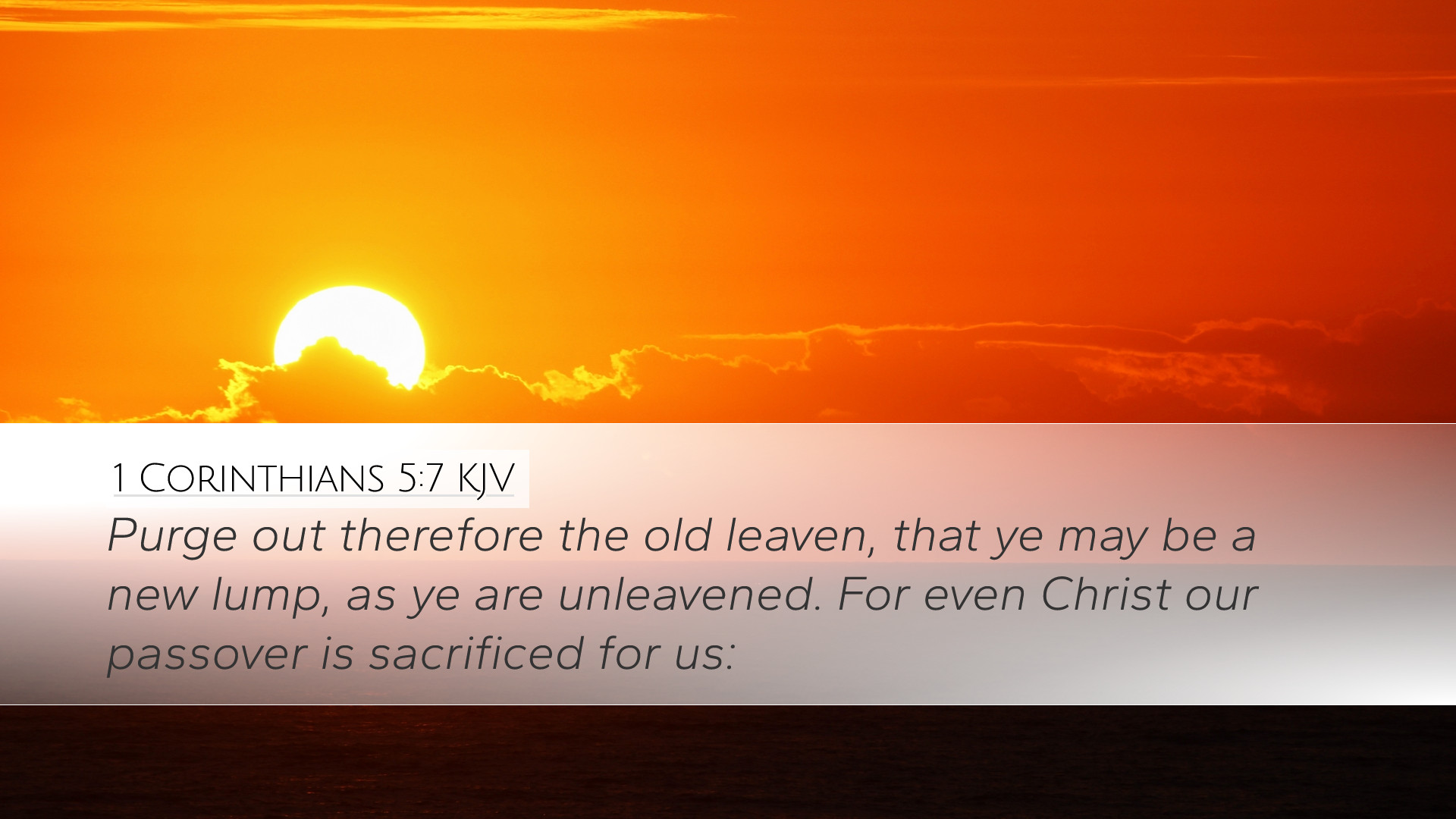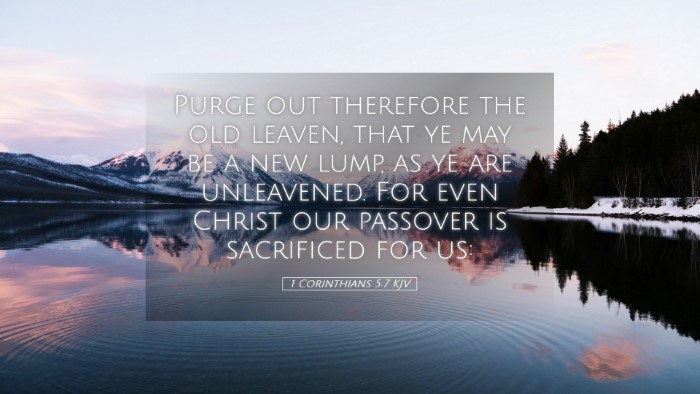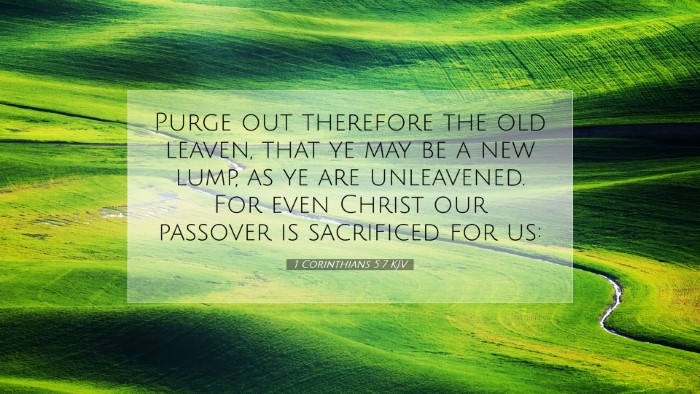Old Testament
Genesis Exodus Leviticus Numbers Deuteronomy Joshua Judges Ruth 1 Samuel 2 Samuel 1 Kings 2 Kings 1 Chronicles 2 Chronicles Ezra Nehemiah Esther Job Psalms Proverbs Ecclesiastes Song of Solomon Isaiah Jeremiah Lamentations Ezekiel Daniel Hosea Joel Amos Obadiah Jonah Micah Nahum Habakkuk Zephaniah Haggai Zechariah Malachi1 Corinthians 5:7
1 Corinthians 5:7 KJV
Purge out therefore the old leaven, that ye may be a new lump, as ye are unleavened. For even Christ our passover is sacrificed for us:
1 Corinthians 5:7 Bible Commentary
Commentary on 1 Corinthians 5:7
In 1 Corinthians 5:7, the Apostle Paul writes: "Purge out therefore the old leaven, that ye may be a new lump, as ye are unleavened. For even Christ our passover is sacrificed for us." This verse is rich with theological significance and biblical symbolism, connecting the themes of purity, sacrifice, and redemption. Below, we explore insights from various public domain commentaries to deepen understanding of this critical passage.
Contextual Overview
Paul, addressing the church in Corinth, speaks to issues of immorality within the community. The metaphor of leaven, often associated with sin, serves as a crucial point in his argument for moral and communal purity. The reference to Christ as the Passover lamb places the teaching within the larger narrative of Jewish tradition and its fulfillment in the New Covenant.
Exegesis of Key Phrases
Purge Out Therefore the Old Leaven
Matthew Henry highlights the need for spiritual cleansing, stating that the "old leaven" symbolizes the corrupt practices and attitudes that can permeate a community of believers. He emphasizes the imperative nature of this command, indicating that neglecting to purge such behavior can lead to greater corruption.
That Ye May Be a New Lump
Albert Barnes identifies the "new lump" as representing the redeemed community, transformed by the grace of God. The imagery suggests a collective identity, where believers are called to embody new life in Christ, free from the influences of past sins.
As Ye Are Unleavened
Adam Clarke elaborates on the metaphor of unleavened bread, which in the Jewish tradition represents purity and holiness. He notes that through Christ’s sacrifice, believers are declared righteous and thus called to live in alignment with their new identity. This is not merely a call to abstain from sin but an invitation to embrace the new life bestowed upon them through faith.
For Even Christ Our Passover is Sacrificed for Us
This phrase stands at the theological heart of the verse. Matthew Henry observes that the reference to Christ as the Passover connects to the historical significance of the Exodus, where the sacrificial lamb's blood marked the deliverance of Israel. Paul draws a parallel to illustrate how Christ is the ultimate fulfillment of this sacrifice, rescuing believers from the bondage of sin.
Theological Implications
The message of 1 Corinthians 5:7 transcends its immediate context, inviting reflection on the nature of salvation and communal life in Christ.
- Sanctification: The call to purge implies an ongoing process of sanctification. Believers are continually invited to evaluate and cleanse their lives of sin, reflecting the holiness of God.
- Community Responsibility: Paul’s address to the church indicates that moral integrity is a collective responsibility. The actions of one can impact the whole body, echoing the principle that "a little leaven leaveneth the whole lump."
- Christological Focus: Jesus’ sacrificial role as the Passover lamb centralizes the discussion around His atoning work. It frames the necessity of holiness not as a legalistic obligation but as a response to His love and grace.
Pastoral Applications
For pastors and church leaders, this passage serves as a reminder of the importance of church discipline and moral accountability within the Christian community.
- Encouragement toward Holiness: Leaders are tasked with encouraging congregants to pursue lives that reflect their new identity in Christ. This may involve teaching on the nature of sin and its consequences.
- Restorative Discipline: The goal of confronting sin in the church should always be restoration, aimed at maintaining the integrity of the body of Christ.
Conclusion
1 Corinthians 5:7 encapsulates a profound teaching on the necessity of purity in the life of believers, grounded in the sacrificial love of Christ. By engaging with the metaphor of leaven and the identity of Christ as our Passover, we are invited to partake in the transformative work of God in our lives and within our communities. This text challenges us both theologically and practically, urging us to live as a reflection of the new creation we are called to be.


